Ethical Challenges in Clinical Experimentation and Vaccines
By Fausto Martinez & Andrea Iannone –
Bioethics is the discipline that studies human behavior in healthcare and life sciences. It also examines values, rational, and moral principles at the basis of decisions in medicine and biology. Bioethicists recognize that mankind has always pursued greater knowledge, and that the goal of scientific research is to obtain concrete benefits for patients. Therefore, bioethicists are often concerned about the researcher or doctor on one hand, and the patient as the subject of experimentation on the other. In between them lie a vast array of recent technological developments (for example, biotechnology) that stimulate a series of questions. Is science “unstoppable” or does it have limits? Is biomedical technology truly morally neutral? Is emphasizing the human utility of scientific investigation and experimentation ethically relevant?
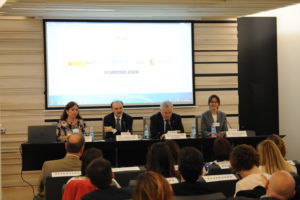 Researchers addressed these and other questions at the third symposium by A.S.I.E.R.I (Asociación de Investigadores Españoles en la República Italiana, the Association of Spanish Researchers in Italy) on May 18, 2018, at the the Real Academia de España en Roma, Italy. The topic of the conference was “Responsible Innovation and Research”. Further discussion centered on the I-Consent project, funded by the European Union Horizon 2020 Programme. Briefly put, the project aims to improve guidelines on informed consent in vulnerable populations under a gender perspective.
Researchers addressed these and other questions at the third symposium by A.S.I.E.R.I (Asociación de Investigadores Españoles en la República Italiana, the Association of Spanish Researchers in Italy) on May 18, 2018, at the the Real Academia de España en Roma, Italy. The topic of the conference was “Responsible Innovation and Research”. Further discussion centered on the I-Consent project, funded by the European Union Horizon 2020 Programme. Briefly put, the project aims to improve guidelines on informed consent in vulnerable populations under a gender perspective.
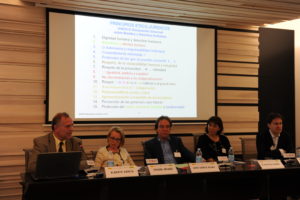
Innovation and research can be defined as “responsible” if they respect human rights. Based on the ethical and juridical principles of the Universal Declaration on Bioethics and Human Rights, human rights are human beings’ inherent moral and legal entitlements to dignity, liberty, and equality at any historical moment, in any context. Therefore, the human dignity of both the patient and the researcher must be respected in scientific research and medical practice.
Since they can experience pain, distress and lasting damage, animals are also entitled to humane treatment in medical and scientific research. Whenever possible, appropriately licensed scientists should experiment with specimens with lower neurophysiological sensitivity, thus reducing the number of live vertebrates involved. When animals with higher pain sensitivity are necessary for experimental purposes, researches are advised to adopt techniques to avoid suffering, stress, or injury.
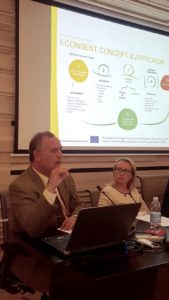
During the symposium, Prof. Alberto García, Director of UNESCO Chair in Bioethics and Human Rights at Università Europea di Roma and the Pontifical Athenaeum Regina Apostolorum, underscored the importance of respecting the human patient’s privacy. This process includes compliance on the part of the experimenting institution with data collection and sharing regulation being paramount. Patients have a right to know what data is collected, with whom it is shared, and how they can rectify or delete it – if they so choose – in the future.
According to García, non-discriminatory and non-stigmatizing medical research practices ensure the equal treatment of patients. He also stated that patients’ rights need to be observed not only during research, but also after its completion. Once a drug has been released onto the market, there must be a phase of pharmaceutical vigilance to monitor identify and evaluate previously unreported adverse reactions to the drug.
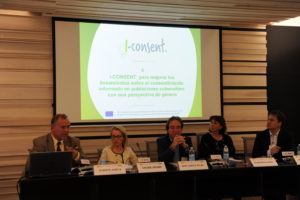 In his last point, Garcia discussed the I-Consent project. In particular, our UNESCO Chair will explore and analyze baseline knowledge of IC for the development and validation of ethical issues concerning informed consent in translational/clinical research and vaccination. Clear informed consent procedures ensure that patients’ dignity is upheld. Informed Consent is a document of utmost important for a patient since it allows him to voluntarily decide to participate in research. However, the research’s objectives are often not shared with the concerned stakeholders. That is why informed consent must become a process during which patients have the essential information clearly presented to them. Innovative tools, such as videos, comic strips, or apps might favor communication among all stakeholders. If not, those unable to consent – often the most vulnerable among us – risk seeing their human rights violated.
In his last point, Garcia discussed the I-Consent project. In particular, our UNESCO Chair will explore and analyze baseline knowledge of IC for the development and validation of ethical issues concerning informed consent in translational/clinical research and vaccination. Clear informed consent procedures ensure that patients’ dignity is upheld. Informed Consent is a document of utmost important for a patient since it allows him to voluntarily decide to participate in research. However, the research’s objectives are often not shared with the concerned stakeholders. That is why informed consent must become a process during which patients have the essential information clearly presented to them. Innovative tools, such as videos, comic strips, or apps might favor communication among all stakeholders. If not, those unable to consent – often the most vulnerable among us – risk seeing their human rights violated.
Masterclass in Neurobioethics “Neurobioethics and Transhumanism” Theology’s perspective on human head transplantation
by Giulia Bovassi –
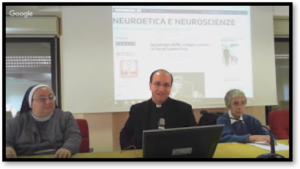 How should theology interpret transhumanism? What can be said about the man’s relation to God, his spiritual striving, and his self-understanding? These are just some of the questions that emerged during the meeting on Friday April 20 during the speeches held by professors Giorgia Salatiello and Sr. Daniela Del Gaudio.
How should theology interpret transhumanism? What can be said about the man’s relation to God, his spiritual striving, and his self-understanding? These are just some of the questions that emerged during the meeting on Friday April 20 during the speeches held by professors Giorgia Salatiello and Sr. Daniela Del Gaudio.
«A spiritual revolution» and a pure «technical» action are among the most highlighted points during latest session of the Masterclass in Neurobioethics, “Neurobioethics and Transhumanism.”, Dr. Sergio Canavero emphasized the possibility of a head transplantation of human beings, a possibility often met with precaution.
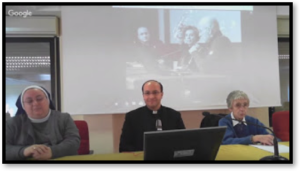 GdN coordinator Fr. Alberto Carrara, discussed how many thinkers disregard a specific vision about human nature and consequently ethical action. He insisted that human acts cannot be isolated from a relationship with freedom, responsibility and dignity, which are decisive elements for every medical action. The doctor should join, assemble, restore the functioning between the living body and the deceased donor’s body. The doctor could, erroneously, glimpse a mere “producing” in what he is doing, reducing the meeting between doctor and patient to an approach between an operator and an object. In the body transplantation case, one’s original vocation is to take care for the other. Every ill person directs his fears and hopes to the other person’s competence, letting the doctor enter his lives in a concrete act of trust, both professional and human.
GdN coordinator Fr. Alberto Carrara, discussed how many thinkers disregard a specific vision about human nature and consequently ethical action. He insisted that human acts cannot be isolated from a relationship with freedom, responsibility and dignity, which are decisive elements for every medical action. The doctor should join, assemble, restore the functioning between the living body and the deceased donor’s body. The doctor could, erroneously, glimpse a mere “producing” in what he is doing, reducing the meeting between doctor and patient to an approach between an operator and an object. In the body transplantation case, one’s original vocation is to take care for the other. Every ill person directs his fears and hopes to the other person’s competence, letting the doctor enter his lives in a concrete act of trust, both professional and human.
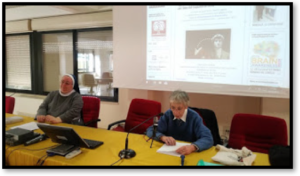 The two interventions, “Theological Anthropology Questions about the Recent Scenarios Raised by Transhumanism” by Prof. Giorgia Salatiello (Pontifical Gregorian University) and “The Creational Destination of Man to Immortality: Identity and Resurrection” by Prof. Sr. Daniela Del Gaudio (Pontifical Urbaniana University), extended the consideration to the central points of the Trans and Posthumanist movement, and theology, in some concepts of common interest (for example immortality, life, meaning of death, of freedom, of corporeality, of the person and the task entrusted to him when God is perceived in his origins), promoting an exchange as constructive as possible. In this sense, during the first intervention some themes, particularly suggested throughout the Masterclass’s opening lectures, re-emerged, confirming the fact that, using Prof. Salatiello’s words, «transhumanism constitutes a major challenge for theological anthropology»: to embrace a vision of the human being as a creature implies that our free action is not arbitrariness (without constraints, bare of foundations); greater dependence on God implies greater freedom because God places the creature free (in the Christian conception freedom is constitutively oriented to the good). The concept of “person” is a notion that contains in itself the relationship with God, the uniqueness of the individual and, again, the free response to the loving call.
The two interventions, “Theological Anthropology Questions about the Recent Scenarios Raised by Transhumanism” by Prof. Giorgia Salatiello (Pontifical Gregorian University) and “The Creational Destination of Man to Immortality: Identity and Resurrection” by Prof. Sr. Daniela Del Gaudio (Pontifical Urbaniana University), extended the consideration to the central points of the Trans and Posthumanist movement, and theology, in some concepts of common interest (for example immortality, life, meaning of death, of freedom, of corporeality, of the person and the task entrusted to him when God is perceived in his origins), promoting an exchange as constructive as possible. In this sense, during the first intervention some themes, particularly suggested throughout the Masterclass’s opening lectures, re-emerged, confirming the fact that, using Prof. Salatiello’s words, «transhumanism constitutes a major challenge for theological anthropology»: to embrace a vision of the human being as a creature implies that our free action is not arbitrariness (without constraints, bare of foundations); greater dependence on God implies greater freedom because God places the creature free (in the Christian conception freedom is constitutively oriented to the good). The concept of “person” is a notion that contains in itself the relationship with God, the uniqueness of the individual and, again, the free response to the loving call.
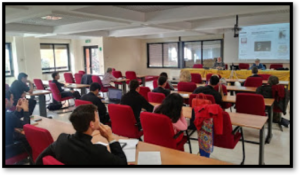 Transhumanist language often indicates a fluid, evolutionary view of the human being, together with the lack of distinction between him and artifacts or between man and animal. The individual (a term more commonly used precisely because it can underline the ontological poverty in the definition of person) is drastically reduced to the dualistic vision of himself.
Transhumanist language often indicates a fluid, evolutionary view of the human being, together with the lack of distinction between him and artifacts or between man and animal. The individual (a term more commonly used precisely because it can underline the ontological poverty in the definition of person) is drastically reduced to the dualistic vision of himself.
Sr. Daniela Del Gaudio further analyzed the theological comparison in the light of eschatology, linking the substantiality of the human being as a relational being in his relationship with God and in the human being as integrated whole, whose soul informs the matter and whose identity is substantially shaped by the spiritual element. The body historically characterizes the person in the union through the spiritual trait, which remains when everything else changes. Facing the attempt of some doctrines to dissolve the unity of the human being through the subtraction of the soul, Prof. Del Gaudio spoke of «pneumatic realism», using Pope Benedict XVI’s expression, in response to thorny questions, such as the doubts about the identity of the resurrected bodies, if separated from the soul. 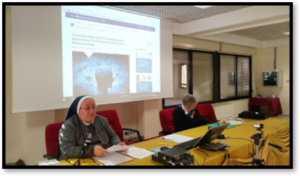 In the resurrection, the soul will reshape the matter in that same form that «virtually preserves in itself», our corporeity will be transfigured and renewed on the model of Christ. The encounter with Christ marks a new life and following of Christ reveals the vocation to immortality, a call to eternal life. The Catholic Church affirms that there is a resurrection: our body preserves its identity in it and the human Ego subsists and survives, despite the dissolution of the body. Through Christ’s victory over death, which becomes a liberation and fulfillment. Here death, suffering, and pain finds new meaning and eternal life perpetuates the call to live with Christ, a communion that makes all other relationships more complete and alive.
In the resurrection, the soul will reshape the matter in that same form that «virtually preserves in itself», our corporeity will be transfigured and renewed on the model of Christ. The encounter with Christ marks a new life and following of Christ reveals the vocation to immortality, a call to eternal life. The Catholic Church affirms that there is a resurrection: our body preserves its identity in it and the human Ego subsists and survives, despite the dissolution of the body. Through Christ’s victory over death, which becomes a liberation and fulfillment. Here death, suffering, and pain finds new meaning and eternal life perpetuates the call to live with Christ, a communion that makes all other relationships more complete and alive.
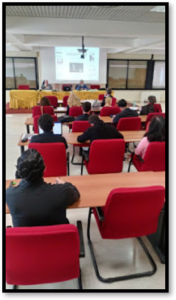 At the conclusion of the round-table seminar, there was a debate on the ideas of the “Letter Placuit Deo to the Bishops of the Catholic Church on Certain Aspects of Christian Salvation” of the Congregation for the Doctrine of the Faith, in which explicit reference is made to two tendencies now widely spread, or from which certain school of thought seem to draw inspiration: neo-Pelagianism and neo-Gnosticism. The first consists in man’s effort to achieve salvation by himself, observable in the way he uses (or becomes a servant of) the technique, then robotics, technologies, etc; the second seeks a subjective salvation through the liberation from the body. Transhumanism contains tendencies toward both of these two approaches, «two temptations of the human being».
At the conclusion of the round-table seminar, there was a debate on the ideas of the “Letter Placuit Deo to the Bishops of the Catholic Church on Certain Aspects of Christian Salvation” of the Congregation for the Doctrine of the Faith, in which explicit reference is made to two tendencies now widely spread, or from which certain school of thought seem to draw inspiration: neo-Pelagianism and neo-Gnosticism. The first consists in man’s effort to achieve salvation by himself, observable in the way he uses (or becomes a servant of) the technique, then robotics, technologies, etc; the second seeks a subjective salvation through the liberation from the body. Transhumanism contains tendencies toward both of these two approaches, «two temptations of the human being».
The question emerges: «Can the man who can dispose of everything also dispose of himself as he pleases?». This is an urgent question that must be answered to protect the fundamental rights of man so that he will be guarded, not dominated, by his neighbors and his works.
“Refugee Crisis Background and Solutions”, 16th April. Nicosia, Cyprus
According to the Cyprus Mail Online, an average of 70,000 people trying to escape the war zones reaching Europe have been stuck in Cyprus, Italy or Spain. These countries share a common path: huge waves of migrants, refugees, asylum seekers who want a better life and thus risk everything they have, even their own life: “It is better to die in the sea than in the desert.” – Mohamed
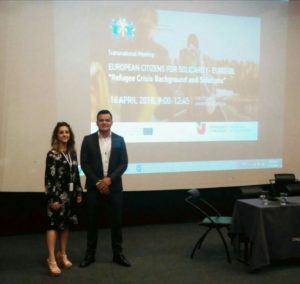 Since last March representatives of these countries along with UK, Bulgaria, Poland, and Lithuania have been gathered to discuss the migrants’ and refugees’ situation within the EUROSOL project funded by the EU.
Since last March representatives of these countries along with UK, Bulgaria, Poland, and Lithuania have been gathered to discuss the migrants’ and refugees’ situation within the EUROSOL project funded by the EU.
On the 16th April, the UNESCO Chair collaborators Serena Montefusco and Kevin Ramirez took part in the conference organized by the University of Nicosia Research Foundation, Cyprus, entitled “Refugee Crisis Background and Solutions” with the European Citizens for Solidarity (EUROSOL) project. Once again the eight partners of the EUROSOL project, including UNESCO Chair, gathered together to discuss the refugee crisis that the European Union (EU) is facing, specifically Cyprus.
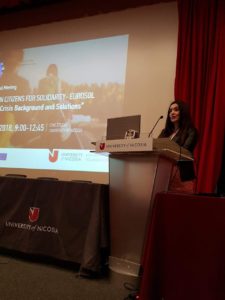 After the introduction and greetings by the Rector of the University and the explanation of the progress of the project by the coordinator Clara Ubeda, the day of discussion developed in four different sessions:
After the introduction and greetings by the Rector of the University and the explanation of the progress of the project by the coordinator Clara Ubeda, the day of discussion developed in four different sessions:
- “Refugee crisis: States’ Sovereignty vs. Human Rights. Debate by Law Students”
- “Refugee Crisis: Psychological Impact on Individuals and Families. Debate by Psychology students”
- “Refugee Crisis: Solutions and Interventions Based on Solidarity and Human Rights”
- “Refugee Crisis: Towards Durable Solutions”
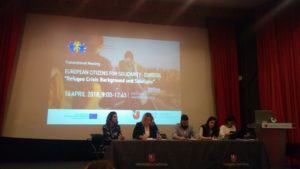 UNESCO Chair collaborator, Serena Montefusco was involved as a moderator in the first round table in which students of the Faculty of Law presented on the principle of non-refoulement. The three students analyzed both the right to asylum and the principle of non-refoulement under the European law. Giving an overview of the laws, protocols, regimes implemented by the EU it was possible to argue how the law is not transparent and distant from the actual reality. In other words, there are many laws that regulated the right to asylum that are not always clear and followed neither in their integrity nor partially. This concept was confirmed by Montefusco when presenting her collaboration with an NGO (ASCS – Associazione Scalabriniana alla Cooperazione e Sviluppo) in Italy that develops social inclusion programs in favor of migrants and refugees. Presenting the role that the UNESCO Chair has in this project, she also referred to her volunteering experience collected with migrants and refugee in both Rome and South of Italy where the level of exploitation and corruption is extremely high. The round table was moderated not only by Montefusco, but also by Emilia Strovolidou (UNHCR, CY) who gave another detailed perspective of the refugees’ situation in Cyprus. The numbers are frightening considering how many people have been stuck in both Italian and Cyprus coasts and shelters not allowed to obtain the refugee status or threatened to be send back to their country of origin. As pointed out by the psychology students, migrants and refugees face different types of traumas at the different stages of their journey.
UNESCO Chair collaborator, Serena Montefusco was involved as a moderator in the first round table in which students of the Faculty of Law presented on the principle of non-refoulement. The three students analyzed both the right to asylum and the principle of non-refoulement under the European law. Giving an overview of the laws, protocols, regimes implemented by the EU it was possible to argue how the law is not transparent and distant from the actual reality. In other words, there are many laws that regulated the right to asylum that are not always clear and followed neither in their integrity nor partially. This concept was confirmed by Montefusco when presenting her collaboration with an NGO (ASCS – Associazione Scalabriniana alla Cooperazione e Sviluppo) in Italy that develops social inclusion programs in favor of migrants and refugees. Presenting the role that the UNESCO Chair has in this project, she also referred to her volunteering experience collected with migrants and refugee in both Rome and South of Italy where the level of exploitation and corruption is extremely high. The round table was moderated not only by Montefusco, but also by Emilia Strovolidou (UNHCR, CY) who gave another detailed perspective of the refugees’ situation in Cyprus. The numbers are frightening considering how many people have been stuck in both Italian and Cyprus coasts and shelters not allowed to obtain the refugee status or threatened to be send back to their country of origin. As pointed out by the psychology students, migrants and refugees face different types of traumas at the different stages of their journey.
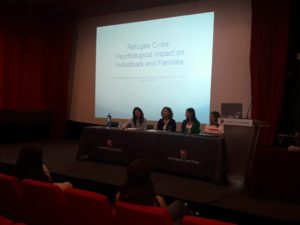 The second round table, moderated by Asya Rafaelova-Eneva of the Altius Francsico d Vitoria Fundation (Spain) and Bistra Choleva-Laleva of BIDA e.V Kultur un Bilding (Germany), one of the eight partners of the EUROSOL projects, analyzed, thanks to the Psychology students, the psychological impact that being an immigrant might cause to individuals and family. Indeed, there are a lot of studies that have seen that these people are affected by PTSD that cause panic attacks, depression, difficulties in maintaining relationships, suicidal thoughts, sleeping problems and others. These students presented three different cases of three Somalian girls who were affected by these symptoms due to the tremendous journey that they take to reconcile with their families in different parts of Europe. In cases of traumas, not only the work of psychologists is fundamental to get through the fears, but also social workers play a crucial role in the process of a successful social inclusion.
The second round table, moderated by Asya Rafaelova-Eneva of the Altius Francsico d Vitoria Fundation (Spain) and Bistra Choleva-Laleva of BIDA e.V Kultur un Bilding (Germany), one of the eight partners of the EUROSOL projects, analyzed, thanks to the Psychology students, the psychological impact that being an immigrant might cause to individuals and family. Indeed, there are a lot of studies that have seen that these people are affected by PTSD that cause panic attacks, depression, difficulties in maintaining relationships, suicidal thoughts, sleeping problems and others. These students presented three different cases of three Somalian girls who were affected by these symptoms due to the tremendous journey that they take to reconcile with their families in different parts of Europe. In cases of traumas, not only the work of psychologists is fundamental to get through the fears, but also social workers play a crucial role in the process of a successful social inclusion.
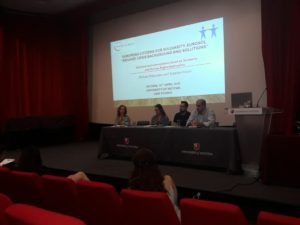 The third round table moderated by the University of Nicosia Research Foundation Director Stefanos Spaneas and Beata Palac, representative of the Poland partner within the EUROSOL project, presented the impressive work and the role of social workers in refugees related matters. Students of the social work program at the University of Nicosia emphasized the importance of values such as freedom, dignity, equity, and solidarity and rights such as the right to education, work and to have a house. Social workers promote the mutual integration among locals and migrants through a multidisciplinary work (psychologist, lawyers, interpreters, …) to ameliorate the migrants’ situation providing them training courses to find better jobs position to give back to society.
The third round table moderated by the University of Nicosia Research Foundation Director Stefanos Spaneas and Beata Palac, representative of the Poland partner within the EUROSOL project, presented the impressive work and the role of social workers in refugees related matters. Students of the social work program at the University of Nicosia emphasized the importance of values such as freedom, dignity, equity, and solidarity and rights such as the right to education, work and to have a house. Social workers promote the mutual integration among locals and migrants through a multidisciplinary work (psychologist, lawyers, interpreters, …) to ameliorate the migrants’ situation providing them training courses to find better jobs position to give back to society.
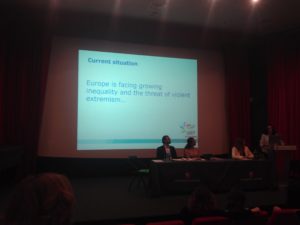 The last session was dedicated to discussing possible solutions and to analyzing some programs that are already implemented and that are better the life of many. Introduced by Dr. Despina Cochliou, the representative of the Erasmus Plus program, the program could share the language courses that the European Union is providing for free. As well known, the knowledge of the local language when one is forced to move to another place is fundamental. Many people in the audience did not know that funds are not only implanted in Cyprus but also in other different countries. Thus, it seems that the European Union needs to improve the way the news is spread. Yet, it is reassuring that there are people that dedicate their lives to this type of work that informs migrants that there are possibilities and accessibility to these programs. Next, Dr. Despina Cochliou introduced an NGO named AWARE (Cyprus) which is a communication and counseling agency which is committed to raise awareness of refugees related matters. They own a constantly updated website and active profiles on social media allowing the share of the latest news and connection among different ethnical groups. The session concluded with the testimony of two refugees that had the possibility to recreate their life in Cyprus. They are both well-educated Syrians, one of whom is working as a leader, mentor and life coaching and the other of whom obtained two bachelor’s degrees in Law Banking and Economics. For privacy reasons, I am not sharing their names, but they serve as an example of a successful social inclusion.
The last session was dedicated to discussing possible solutions and to analyzing some programs that are already implemented and that are better the life of many. Introduced by Dr. Despina Cochliou, the representative of the Erasmus Plus program, the program could share the language courses that the European Union is providing for free. As well known, the knowledge of the local language when one is forced to move to another place is fundamental. Many people in the audience did not know that funds are not only implanted in Cyprus but also in other different countries. Thus, it seems that the European Union needs to improve the way the news is spread. Yet, it is reassuring that there are people that dedicate their lives to this type of work that informs migrants that there are possibilities and accessibility to these programs. Next, Dr. Despina Cochliou introduced an NGO named AWARE (Cyprus) which is a communication and counseling agency which is committed to raise awareness of refugees related matters. They own a constantly updated website and active profiles on social media allowing the share of the latest news and connection among different ethnical groups. The session concluded with the testimony of two refugees that had the possibility to recreate their life in Cyprus. They are both well-educated Syrians, one of whom is working as a leader, mentor and life coaching and the other of whom obtained two bachelor’s degrees in Law Banking and Economics. For privacy reasons, I am not sharing their names, but they serve as an example of a successful social inclusion.
The UNESCO Chair in Bioethics and Human Rights that bases its values on the 15 points of the Universal Declaration of Bioethics and Human Rights (2005) has the responsibility to pursue the safeguarding of human rights in the recognition of the dignity of both locals and migrants through interreligious and multicultural dialogue. Since 2009, the Chair has been committed to achieving the objectives established since its foundation: promoting the art of convergence and cooperation in global ethics through its areas of interest that allow a continuous dialogue between experts on bioethics principles.
The Migrant’s Influence in the EU Labour Market: Positive and Negative Aspects. Study Case: Italy
On Monday February 19th, the UNESCO Chair in Bioethics and Human Rights collaborators Serena Montefusco and Kevin Ramirez took part in the event host by BIDA e. V. Kultur and Bildunng, at the Jean Monnet Centre of Excellence in Berlin. As part of the eight partners of European Citizens for Solidarity (EUROSOL) project, co-funded by the Europe for Citizens programme of the European Union, BIDA e. V. Kultur and Bildunng gathered different experts in the field of the migrant’s influence in the EU labour market.
The first session opened with the presentation of the Fundación Altius Francisco de Vitoria on the main aspects, aims and prospects of EUROSOL project by the European Director Clara Úbeda Saelices. The event moved on to Javier Jimenez opening the round table introducing the migrant’s influence at the EU labour market in Spain. He pointed out that there is a great number of Romanian migrants due to the similar language and that they are mostly employed in the service sector. The discussions moved on to the presentation of the VHS Hildburghausen, an organization that provides education for adults aiming at improving social inclusion and job solutions. Finally, the representative of the UNESCO Chair, Serena Montefusco had the chance to be part of the round table analysing the migrant’s influence at the EU labour market form the Italian perspective.
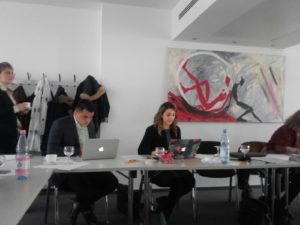 Serena Montefusco started giving information how institutions are dealing with the great number of migrants arriving in Italy. At the European level, she saw that soft low and funding activities have been implemented to improve the labour market and integration of migrants. For example, in 2016, thanks to the Action Plan on the Integration of the Third Country Nationals and the New Skills Agenda for Europe, it was possible to implement new tools aiming at helping integrate newcomers and local stakeholders assess their qualifications and skills. Moreover, Europe is offering significant funding for labour market integration. Yet, these funds are granted by each Member State and reach cities indirectly. At National level, institutions are responsible for labour law, social security, and active employment policies. Even though decentralized member states, such as Italy, face a formal devolution of responsibilities, the national government sets out an integration plan, objectives, and managing public employment services.
Serena Montefusco started giving information how institutions are dealing with the great number of migrants arriving in Italy. At the European level, she saw that soft low and funding activities have been implemented to improve the labour market and integration of migrants. For example, in 2016, thanks to the Action Plan on the Integration of the Third Country Nationals and the New Skills Agenda for Europe, it was possible to implement new tools aiming at helping integrate newcomers and local stakeholders assess their qualifications and skills. Moreover, Europe is offering significant funding for labour market integration. Yet, these funds are granted by each Member State and reach cities indirectly. At National level, institutions are responsible for labour law, social security, and active employment policies. Even though decentralized member states, such as Italy, face a formal devolution of responsibilities, the national government sets out an integration plan, objectives, and managing public employment services.
According to the latest report of the International Organization for Migration (IOM), most migrants, male and female, are employed in low-skilled occupation such as the service sector, agricultural, construction, cleaning, and catering. Their positions have a great impact on the pensions system and in raising the birth rate. It is important not to forget that migrants and refugees cannot be treated as a panacea to address population trends. These can be considered negative aspects of the labour market in Italy since most of the time newcomers are high skilled and not well integrated. Another negative aspect pointed out by Serena, is that migrants are exploited in the countryside during the harvest of tomatoes in the South of Italy. More specifically, she presented the project Io Ci Sto Camp organized by the Diocese of Manfredonia and the Scalabrinian Missionaries. This Camp is an opportunity for service, meeting and sharing between volunteers, migrants and the local community in the province of Foggia. The Camp promotes the autonomy, integration and commitment of migrants in the Italian territory, opposing injustices and breaking down prejudices, accompanying volunteers in a training course in migration, alongside the local Church and civil society to promote the meeting and integration between migrants and the community.
In the second round table, representatives of Bulgaria, Poland, Lithuania, and Cyprus shared their experience in the field pointing out the different issues that their country is facing regarding the flow of migrants. In Bulgaria, due to the different political language it is challenging to address the issue properly. In Poland, the government is against the acceptance of refugees which makes even more difficult discussion and dialogue among the population. In Lithuania, the migration flow is different from the Italian and Cyprus one: most of migrants arriving in Lithuania are from the nearest countries and the acceptance is at a good level. Finally, Cyprus is facing a similar situation as Italy meaning that most refugees and migrants that arrive are Syrian and African who see these two countries as their first aid to move up to the north countries to have a better life, jobs, and education.
One of the Chair’s chief areas of interest since 2009 has been Bioethics, Multiculturalism and Religion. The Chair is thus deeply concerned with promoting and protecting the common human rights of all of all peoples. Migration is a complex phenomenon that affects individuals of all creeds and cultures. Thus, the Chair’s experience in fostering the art of convergence and cooperation in global ethics enables her to join diverse groups of individuals committed to creating more just and welcoming societies.

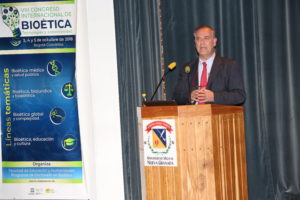 In his lecture titled “Neurobioethics, Placing the Human Being at the Center of Neuroscience, Ethics, and Law” Dr. García reviewed some of the most prominent topics in the field of neurotechnology, and as the title suggests, he was able to explore the ways in which the human being ought to remain the gravitational center of such a rapidly evolving reality.
In his lecture titled “Neurobioethics, Placing the Human Being at the Center of Neuroscience, Ethics, and Law” Dr. García reviewed some of the most prominent topics in the field of neurotechnology, and as the title suggests, he was able to explore the ways in which the human being ought to remain the gravitational center of such a rapidly evolving reality.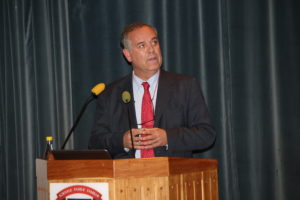 This perception of the human being introduced Dr. García’s next discussion, namely the bioethics of neuroscience. As he insisted, a position open to progress and change must belong to all bioethicists, as long as the overarching anthropological view is not lost. Moral judgement, he stated, must focus on two elements when talking about neuroscientific ends: the means by which they are achieved and their intention. Drawing on this distinction, Dr. García talked about the essential differences between therapy and enhancement, which lead him to address Transhumanism in a neutrally critical way: the disposition to endow the human being with a higher degree of dignity by means of biological enhancement can prove to be a slippery slope, and common good must prevail over individual dispositions. Many questions surround this topic: does all scientific advance constitute progress? Will enhanced human capabilities increase the already existing gap between the rich and the poor? Will the transhuman being constitute a new paradigm that will make the concept of human singularity blur? These and many other issues should always be addressed bearing the idea of human dignity in mind.
This perception of the human being introduced Dr. García’s next discussion, namely the bioethics of neuroscience. As he insisted, a position open to progress and change must belong to all bioethicists, as long as the overarching anthropological view is not lost. Moral judgement, he stated, must focus on two elements when talking about neuroscientific ends: the means by which they are achieved and their intention. Drawing on this distinction, Dr. García talked about the essential differences between therapy and enhancement, which lead him to address Transhumanism in a neutrally critical way: the disposition to endow the human being with a higher degree of dignity by means of biological enhancement can prove to be a slippery slope, and common good must prevail over individual dispositions. Many questions surround this topic: does all scientific advance constitute progress? Will enhanced human capabilities increase the already existing gap between the rich and the poor? Will the transhuman being constitute a new paradigm that will make the concept of human singularity blur? These and many other issues should always be addressed bearing the idea of human dignity in mind.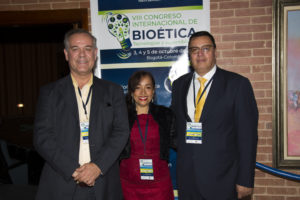 Reversing the actors of his previous discussion, Dr. García talked about the neuroscience of ethics. Or in other words, the ways in which neuroscience can help us understand the intricacies of our moral thought. He explained the problems that arise from the implantation of recent theories that deny the existence of human free will. If there is indeed a measurable relation between certain brain structures and human behavior, if human choices are nothing more than the end of a chain of causality that is merely material, he states, the concepts of responsibility (in moral terms) and imputability (in legal terms) lose all meaning.
Reversing the actors of his previous discussion, Dr. García talked about the neuroscience of ethics. Or in other words, the ways in which neuroscience can help us understand the intricacies of our moral thought. He explained the problems that arise from the implantation of recent theories that deny the existence of human free will. If there is indeed a measurable relation between certain brain structures and human behavior, if human choices are nothing more than the end of a chain of causality that is merely material, he states, the concepts of responsibility (in moral terms) and imputability (in legal terms) lose all meaning.